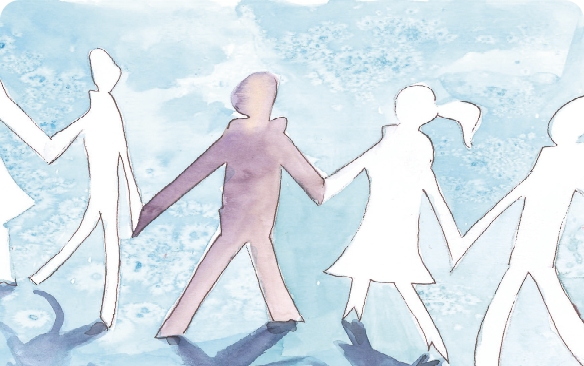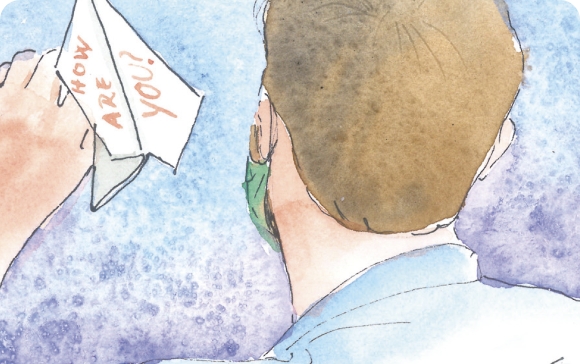
The Candid Book
For families of people living with Schizophrenia
The Candid Book – for families of people living with schizophrenia will help you shape and ground your role as a caregiver and will help you solve dilemmas and answer your questions through medical knowledge, pratical insights, efficient remedies, and caregiver support.
Besides being medical experts in their field, the authors of this book speak for all of us dealing with schizophrenia no matter the roles we play.
CHAPTER 1
Schizophrenia in view
These pages are intended to provide guidance on how to help your loved one live a better life and navigate through the everyday challenges of schizophrenia. It also aims to provide useful information on how to accept and adapt to this new situation in your life, how to become a bridge between the person you care for and healthcare professionals, and last but not least, how to take care of yourself on this challenging, but often rewarding journey.
CHAPTER 2
The 3 A’s of stigma remedy: Acknowledge, Apprehend, Alleviate
You’re not alone!
Other families face similar fears, difficulties, and challenges, and may feel isolated or misunderstood. You can get in touch with them by joining a support group or a caregiver association, and share experiences and advice.
They have the same goal: a positive impact on the lives of people they care for Most importantly, ask healthcare specialists for advice and become actively involved in the conversation
CHAPTER 3
Surmount vs. Surrender
Most people with schizophrenia stay with or return to their relatives and this permanently changes the everyday life of the entire family
Schizophrenia also changes the plans for the future of their loved one, but with proper care and the concerted effort of the entire family, many of these plans may become reality.
Many caregivers feel they have lost their plans, dreams, and expectations and things won’t ever be the same again. This is natural. recognizing and accepting this can facilitate a successful long-term confrontation with the disease
You may have a wide range of reactions: Anger, guilt, sadness, numbness, loneliness, irritability, sleeping difficulties, loss of appetite, and difficulty concentrating
A way of getting to accept these emotions is allowing yourself to experience the complete emotional cycle – from emotional numbness to acceptance of the new circumstances and see your future from a new perspective.
CHAPTER 4
Therapeutic amends
Though a cure for schizophrenia remains unknown at present, the outlook for individuals living with this illness is continuously improving. Treatment usually involves a combination of medication, talking therapy, and social training to facilitate reintegration into society. In severe cases or during crisis periods, hospitalization may be necessary to ensure safety, proper nutrition, sleep, and hygiene.
Schizophrenia necessitates lifelong treatment, even after symptom relief. Treatment is often managed by a team led by an experienced psychiatrist and may include a psychologist, psychiatric nurse, social worker, and case manager. Given the disease’s complexity and individual variations, there is no one-size-fits-all approach. It is essential to explore all options and create a customized treatment plan for each patient. The ultimate goal is to reduce symptoms, prevent relapses, and enhance the overall quality of life.
CHAPTER 5
Coming to terms with your emotions
Caring for a person with schizophrenia is a demanding responsibility that requires an immense amount of time, energy, and commitment. Aside from the daily challenges, caregiving can also evoke a wide array of emotions.
As a caregiver, you may experience conflicting feelings, both POSITIVE AND NEGATIVE EMOTIONS. Enduring such an array of emotions can become EXHAUSTING, and if not carefully managed, they can take a toll on you.
Ignoring your emotions and trying to stay “strong” for your loved one or family is not the solution. Facing your emotions takes courage and is a HEALTHIER approach.
. Embrace your feelings and recognize that they don’t have to dictate your actions. By doing so, negative emotions may subside or become easier to manage. This approach will not only help you provide better care for your loved one but also enable you to take better care of yourself in the long run.
CHAPTER 6
Occupation? Hero caregiver
Being a caregiver might seem like a daunting task at times but help is at hand. Here we take a practical look at some of the things that you can do to help yourself and others when taking care of a person with schizophrenia.
CHAPTER 7
Give yourself care, too
Taking care of a person with schizophrenia may be a major part of your life, but, it should not be the whole of it. Taking some time away from your role as a caregiver will help you appreciate from a distance what you are doing.
CHAPTER 8
Schizophrenia management in the aftermath of the COVID-19 pandemic
This chapter provides valuable insights on navigating the impact of the COVID-19 pandemic on individuals with schizophrenia. It offers guidance for caregivers on maintaining the mental and physical health of their loved ones and themselves during the current and potential future pandemics or similar situations.










